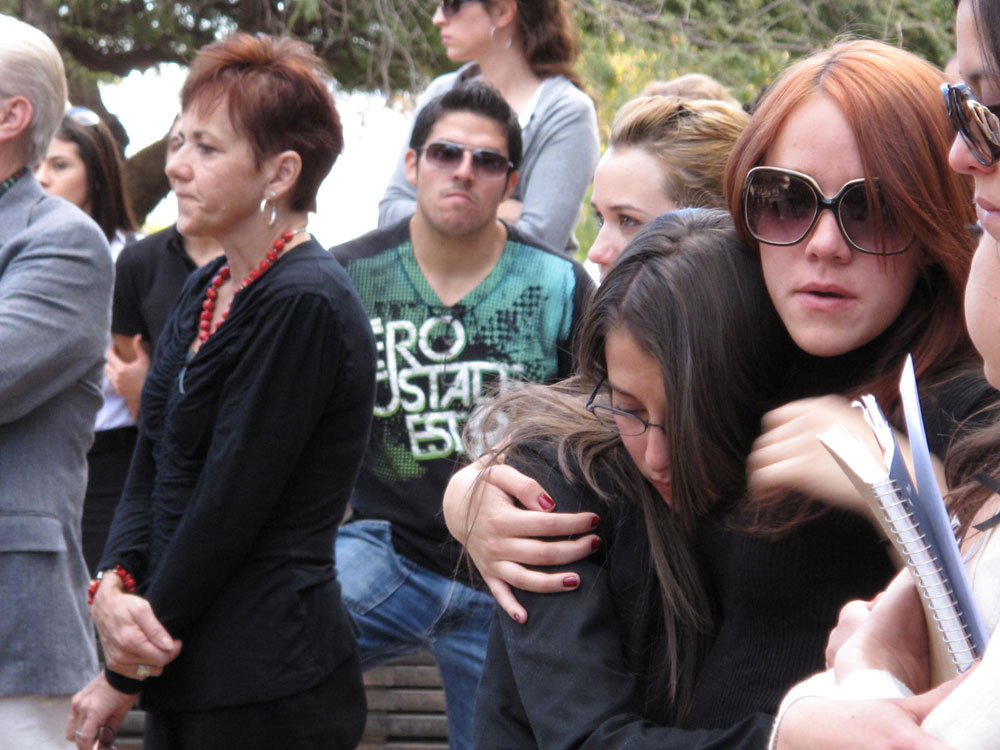EL PASO, Texas — Last week tragedy struck the University of Texas at El Paso when students Eder Andres Diaz Sotero, 23, and Manuel Acosta Villalobos, 22, were gunned down in Ciudad Juarez, Mexico.
Many alike have felt the effects of the violence unfolding in Juarez the past three years. But like many students, faculty members are significantly impacted by the violence across the border.

Classmates of Manuel Acosta and Eder Diaz mourn their deaths at a memorial organized by UTEP officials. (Danya Hernandez/Borderzine.com)
While much can be said about the counseling efforts given to students dealing with tragedies faced daily in Juarez, little is known about the resources available for faculty to help combat the stresses their students have encountered.
“There’s a group of offices that give the professors the support for them to work with students in the classroom,” said Catie McCorry-Andalis, UTEP assistant vice president for student life and associate dean of students. “The approach we have taken on this campus—for a number of years now—is that there is not only one person or one office to address these issues.”
The latest incident is not the first time professors have dealt with such violence directed towards their students.
Earlier this year, on May 25, Alejandro Ruiz Salazar, a 19-year-old sophomore nursing major and Jorge Pedro Gonzalez, a former UTEP Student, were both killed in the violent-infused sister city of El Paso.
With four deaths in less than a year and countless lives effected daily, students have raised concerned whether or not the university is truly prepared to handle such matters again.
“There are so many students here from Mexico, and with the violence increasing daily, I don’t see how UTEP can handle it,” said Marcos Herrera, senior history major at UTEP. “Everyday there is more news about someone else who was killed, I’m sure there is more than just a handful of students feeling the consequence of the drug war.”
According to an El Paso Time article printed in Tuesday’s edition, 6.4 percent of the more than 22,000 students who attend UTEP are Mexican international students, according to university officials.
What you have to understand is that we operate as one community between both sides of our border, said McCorry-Andalis.
“Our approach in everything we do is safety and support for everyone, no matter where they live,” she said. “We’ve done training for (Professors). We have an incredible workshop that the University Police Department, (The Office of Student Life) and the University Counseling Center, we all come together and talk about recognizing signs and where the resources are on campus.”
McCorry-Andalis said professors are often the front line for students to go to because they tend to become very attached to their instructors.
“I can imagine the stresses some professors have, especially with the students who have suffered through tough times,” Herrera said. “There are a few professors that I look up to who are always there to give me guidance, even advice that’s not school related.”
With the drug war’s end in no sight, and student enrollment increasing on a yearly bases, tragedy is surely to strike again. It is not a question of if, but it is simply when.
“You can’t prepare (faculty) for this. It is something that comes with life,” said Richard Padilla, UTEP vice president of student affairs. “This is unique because it is so different from the normal—if there is such a thing, that we lose students. Usually it is an illness or an accident or something, not random acts of violence. It is very tough to deal with.”
Padilla said that this tragedy has affected many lives, not just students and professors at UTEP. He encouraged anyone who would benefit from talking with university counselors to avail themselves because sometimes it raises serious questions inside.
